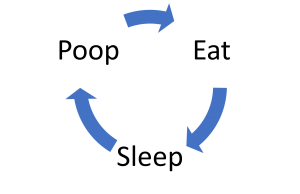Written By: Amanda Shimkus, MA, OTR/L SIPT certified, IMH-E®Infant Family Specialist
Eat. Sleep. Poop. That’s what babies do! Eat, sleep, and poop are the gears of operations to development in a pediatric setting. They are 3 out of the 16 components of interoception. And if you’re not familiar with interoception, let me bring you up to speed. Interoception is the collective perception of one’s internal senses. Interoception awareness provides feedback about how our body is operating. And I am obsessed with gaining an understanding of their operations in a child. And, it does not matter the age of that child when it comes to the importance of interoception. What is going on with their eating (diet), sleeping and pooping is important through all developmental stages. It’s the 3 tiers of the detective work I investigate.


Sleep: How does one know if a child is rested?
Poop: How does a child develop the understanding to eliminate? What’s normal and why does the consistency change? Does it matter?
Yes! It all matters.
Interoception launches a child’s ability to learn what their own baseline homeostasis is. They can identify the perception of their own self. Is the baby receiving adequate nutrients and sleep to develop regulatory skills? What intervention is needed for a baby to function optimally? Because, yes, this surely will impact the trajectory of their neuroplasticity.
“Once a particular plastic change occurs in the brain and becomes well established, it can prevent other changes from occurring.” – Norman Dodge
And, let me not forget one more: Pain. Pain can be such a challenging abstract component of interoception. A high pain tolerance? A low pain tolerance? How do we declare this pain identity for a child? HOW STRESSFUL!
In my interactive course, An Evidence-Based Developmental Approach to the Pediatric Brain, we take a closer look at interoception as well as other building blocks that impact the outcomes of our kids. Let’s get them functioning 😉.
Explore online continuing education courses from Amanda below:
An Evidence-Based Developmental Approach to the Pediatric Brain
Doidge, N., (2007). The Brain That Changes Itself: Stories of Personal Triumph from the Frontiers of Brain Science. New York, NY: Penguin Books.
Craig, A.D. (2015) How Do You Feel? An Interoceptive Moment with your Neurobiological Self: Oxford, United Kingdom: Princeton University Press and Oxford Press.